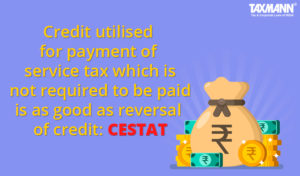Credit utilised for payment of service tax which is not required to be paid is as good as reversal of credit: CESTAT
- Blog|News|GST & Customs|
- 2 Min Read
- By Taxmann
- |
- Last Updated on 11 May, 2022

Case Details: Swarnandhra IJMII Integrated Township Development Company (P.) Ltd. v. Commissioner of Customs, Central Excise & Service Tax - [2022] 138 taxmann.com 120 (Hyderabad-CESTAT)
Judiciary and Counsel Details
-
- P.K. Choudhary, Judicial Member & P.V. Subba Rao, Technical Member
- G. Natrajan, Adv. for the Appellant.
- C. Mallikarjun Reddy, AR for the Respondent.
Facts of the Case
The appellant was developing a huge residential complex comprising around 2300 apartment units. The entire construction activity was sub contracted to the appellant’s group company and it was paying service tax for the amounts received from the buyers, under “Construction of Complex Service” and was also availing CENVAT Credit of the service tax paid on input services.
A SCN was issued in which it was alleged that the appellant was not undertaking any construction and entire construction activity was sub-contracted. Since, the appellant was not providing any taxable service, therefore, the entire amount of service tax collected by the appellant from buyers was liable to be paid to the government in cash and the entire credit availed by the appellant was sought to be disallowed. The demand was raised and the appellant filed appeal against the order.
CESTAT Held
The Honorable CESTAT relied on the decision of Apex Court in case of CCE v. Larson & Toubro Ltd. [2015] 60 taxmann.com 354 wherein it was held that composite contracts involving transfer of property in goods is not liable to Service Tax prior to 1.6.2007. Since the appellant was not liable to pay service tax, it would also not be entitled to avail Cenvat credit. However, the credit has already been utilised for payment of service tax which is not required to be paid shall be as good as reversal of credit and further liability is absent. Therefore, the demand towards ineligible credit was confirmed and the amount reversed as payment of service tax would be treated as reversal.
List of Cases Reviewed
-
- CCE v. Larson & Toubro Ltd. [2015] 60 taxmann.com 354/52 GST 1 (SC) (para 8)
- Indu Eastern Province Project Ltd. 2019 (20) GSTL 88 (Trib. – Hyd.) (para9)
- Everest Industries Ltd. v. CCE – 2019 (369) E.L.T. 1569 (Trib. – Chennai) (para 11)
- Union of India v. Indian National Shipowners Association – 2010 (17) STR J57 SC (para 16) followed.
List of Cases Referred to
-
- CCE v. Ratan Melting & Wires Industries 2008 taxmann.com 1649 (SC) (para 4)
- Ranadey Micronutrients v. CCE 1996 taxmann.com 360 (SC) (para 4)
- CCE v. Larson & Toubro Ltd. [2015] 60 taxmann.com 354/52 GST 1 (SC) (para 4)
- State of AP v. Larson & Toubro Ltd. 2009 taxmann.com 930 (SC) (para 4)
- Everest Industries Ltd. v. CCE 2019 (369) ELT 1569 (Tri. – Chennai) (para 4)
- Indu Eastern Province Project (P.) Ltd. 2019 (20) GSTL 88 (Tri. – Hyd.) (para 4)
- Indian National Shipowners v. Union of India [2009] 18 STT 212 (Bom.) (para 4)
- Krishna Homes v. CCE [Final Order No. 50834-50835/2014, dated 14-2-2014] (para 5).
Disclaimer: The content/information published on the website is only for general information of the user and shall not be construed as legal advice. While the Taxmann has exercised reasonable efforts to ensure the veracity of information/content published, Taxmann shall be under no liability in any manner whatsoever for incorrect information, if any.

Taxmann Publications has a dedicated in-house Research & Editorial Team. This team consists of a team of Chartered Accountants, Company Secretaries, and Lawyers. This team works under the guidance and supervision of editor-in-chief Mr Rakesh Bhargava.
The Research and Editorial Team is responsible for developing reliable and accurate content for the readers. The team follows the six-sigma approach to achieve the benchmark of zero error in its publications and research platforms. The team ensures that the following publication guidelines are thoroughly followed while developing the content:
- The statutory material is obtained only from the authorized and reliable sources
- All the latest developments in the judicial and legislative fields are covered
- Prepare the analytical write-ups on current, controversial, and important issues to help the readers to understand the concept and its implications
- Every content published by Taxmann is complete, accurate and lucid
- All evidence-based statements are supported with proper reference to Section, Circular No., Notification No. or citations
- The golden rules of grammar, style and consistency are thoroughly followed
- Font and size that’s easy to read and remain consistent across all imprint and digital publications are applied



 CA | CS | CMA
CA | CS | CMA
